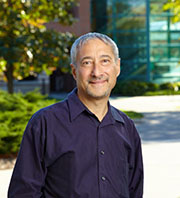MSU journalism students can get paid reporting jobs at Great Lakes Echo, the Knight Center’s award-winning environmental news service.
Details: Continue reading

MSU journalism students can get paid reporting jobs at Great Lakes Echo, the Knight Center’s award-winning environmental news service.
Details: Continue reading

Eric Freedman
By Eric Freedman
Many scientists look at the “big picture” – curing cancer, reversing climate change, saving the rainforest, engineering pothole-proof roadways, developing new alternative energy sources – but sometimes small results are more fascinating and intriguing because they pique our interest as human beings.
Most such aha-moment or quirky-sounding studies don’t appear in the marquis prestige journals that mainstream journalists follow –Nature say, or Science, PNSA or the Journal of the American Medical Association – but in niche journals read by virtually no one outside the discipline or specialty. That means general audiences – often the taxpayers who directly and indirectly fund much scientific research – never hear the results.
It’s the enterprising journalist who finds such findings and shares them with his or her audience. Continue reading
By Eric Freedman
If we want international visitors to understand what makes America so special a country, we need to do more than talk in lofty terms about constitutional rights and economic opportunities. We need to show them more than Los Angeles, Las Vegas, Washington or New York City.
They need to see our national parks – the oldest and most extensive such system in the world. After all, cities are cities. The skyscrapers of Chicago, Shanghai, Tokyo and Dubai are much of the same, but no place else has the geysers of Yellowstone, the grandeur of the Grand Canyon and the towering giants of Sequoia. Continue reading

Students at the Universidad del Desarrollo in Concepcion, Chile, participate in an exercise led by Knight Center faculty. Image: David Poulson
By David Poulson
Chile’s Chiflon del Diablo coal mine descends more than 3,000 feet below sea level before extending some five miles under the Pacific Ocean.
Miners no longer undertake the back-breaking, thigh-burning trek through low tunnels to extract coal – the mine closed in 1990. It’s now a tourist attraction operated by former miners and one that I visited as part of a 10-day swing through Chile while teaching environmental journalism with Knight Center Director Eric Freedman and Research Director Bruno Takahashi.
The three of us recently lectured at four universities in three Chilean cities as part of a $40,000 project funded by the U.S. State Department to further investigative reporting in that country. Continue reading